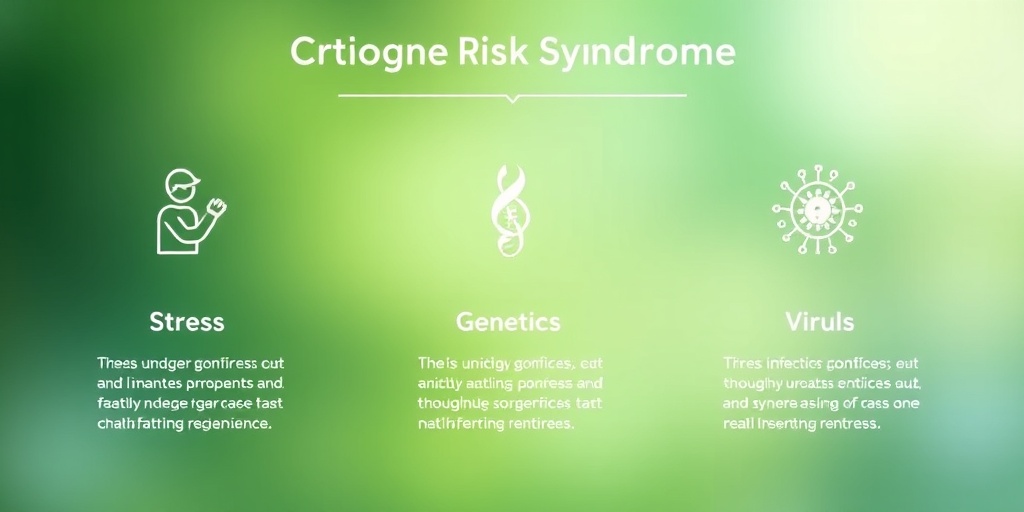What Is CFS?
Chronic Fatigue Syndrome (CFS), also known as Myalgic Encephalomyelitis (ME), is a complex and debilitating disorder characterized by extreme fatigue that lasts for six months or longer and is not improved by rest. This condition can significantly impact daily life, making even simple tasks feel overwhelming. The exact cause of CFS remains unclear, but it is believed to involve a combination of genetic, environmental, and psychological factors.
Understanding the Diagnosis
Diagnosing CFS can be challenging due to its overlapping symptoms with other conditions. According to the ICD-10 (International Classification of Diseases), CFS is classified under code G93.3. Healthcare providers typically rely on a thorough medical history, physical examination, and specific criteria to diagnose this syndrome. It’s essential to rule out other potential causes of fatigue, such as thyroid disorders, sleep apnea, or depression.
Who Is Affected by CFS?
CFS can affect individuals of any age, but it tends to occur more frequently in adults, particularly women. Factors such as a history of viral infections, stress, and certain lifestyle choices may increase the risk of developing CFS. Understanding these risk factors can help in early identification and management of the condition.
CFS Symptoms
The symptoms of Chronic Fatigue Syndrome can vary widely among individuals, making it a highly individualized condition. However, some common symptoms include:
- Persistent Fatigue: The hallmark symptom of CFS is profound fatigue that does not improve with rest and lasts for at least six months.
- Post-Exertional Malaise: Many individuals experience a worsening of symptoms after physical or mental exertion, often referred to as “crashing.”
- Sleep Disturbances: People with CFS often report unrefreshing sleep, insomnia, or other sleep-related issues.
- Cognitive Difficulties: Commonly known as “brain fog,” this includes problems with memory, concentration, and information processing.
- Muscle and Joint Pain: Unexplained pain in muscles and joints is frequently reported, often without any swelling or inflammation.
- Headaches: New types of headaches or a change in the pattern of existing headaches can occur.
- Flu-like Symptoms: Many individuals experience recurrent sore throats, swollen lymph nodes, and low-grade fevers.
Impact on Daily Life
The symptoms of CFS can severely limit an individual’s ability to perform daily activities, leading to a significant decline in quality of life. Many people find it challenging to maintain employment, engage in social activities, or even manage household responsibilities. This can lead to feelings of isolation and frustration, making it crucial for individuals with CFS to seek support from healthcare professionals and support groups.
Seeking Help and Resources
If you or someone you know is experiencing symptoms of CFS, it’s important to consult a healthcare provider for a proper diagnosis and treatment plan. Resources like Yesil Health AI (yesilhealth.com) can provide evidence-based health answers and support for managing chronic conditions like CFS. Remember, you are not alone in this journey, and there are communities and professionals ready to help you navigate the challenges of living with Chronic Fatigue Syndrome.
In conclusion, understanding CFS is the first step toward managing its symptoms and improving quality of life. By recognizing the signs and seeking appropriate care, individuals can take proactive steps toward better health and well-being. 🌟

CFS Causes
Chronic Fatigue Syndrome (CFS), also known as myalgic encephalomyelitis (ME), is a complex disorder characterized by extreme fatigue that doesn’t improve with rest and may worsen with physical or mental activity. Understanding the causes of CFS is crucial for effective management and treatment. While the exact cause remains elusive, several factors have been identified that may contribute to the onset of this debilitating condition.
1. Viral Infections
Many individuals report that their CFS symptoms began after a viral infection. Common viruses associated with CFS include:
- Epstein-Barr virus (EBV)
- Human herpesvirus 6 (HHV-6)
- Cytomegalovirus (CMV)
These infections can trigger an immune response that may lead to prolonged fatigue and other symptoms characteristic of CFS.
2. Immune System Dysfunction
Research suggests that individuals with CFS may have an altered immune response. This dysfunction can manifest as:
- Increased levels of inflammatory markers
- Abnormalities in immune cell function
This immune dysregulation may contribute to the persistent fatigue and other symptoms experienced by those with CFS.
3. Hormonal Imbalances
Hormonal changes, particularly involving the hypothalamic-pituitary-adrenal (HPA) axis, have been observed in CFS patients. This axis plays a crucial role in the body’s stress response. Disruptions in hormone levels can lead to:
- Fatigue
- Sleep disturbances
- Changes in mood
Such imbalances may exacerbate the symptoms of CFS, making it essential to consider hormonal health in treatment plans.
4. Genetic Factors
There is evidence to suggest that genetics may play a role in the development of CFS. Family studies indicate that CFS can run in families, implying a potential hereditary component. Specific genetic markers may predispose individuals to CFS, although more research is needed to identify these markers definitively.
5. Environmental Triggers
Environmental factors, such as exposure to toxins, allergens, or significant stressors, may also contribute to the onset of CFS. These triggers can lead to a cascade of physiological changes that may result in chronic fatigue. Some common environmental triggers include:
- Pollution
- Heavy metals
- Chronic stress
Identifying and mitigating these triggers can be an essential part of managing CFS.
CFS Risk Factors
Understanding the risk factors for CFS can help in identifying individuals who may be more susceptible to developing this condition. While anyone can develop CFS, certain factors may increase the likelihood of its onset.
1. Age and Gender
CFS can affect individuals of any age, but it is most commonly diagnosed in adults between the ages of 30 and 50. Additionally, women are more likely than men to develop CFS, with studies suggesting that hormonal differences may play a role in this disparity.
2. Pre-existing Health Conditions
Individuals with certain health conditions may be at a higher risk for developing CFS. These conditions include:
- Fibromyalgia
- Autoimmune diseases
- Chronic infections
Having these conditions can increase the likelihood of experiencing the debilitating fatigue associated with CFS.
3. Stress and Trauma
High levels of stress, whether from personal, professional, or traumatic events, can trigger the onset of CFS. Chronic stress can lead to physical and emotional exhaustion, making it more challenging for the body to recover and maintain energy levels.
4. Sedentary Lifestyle
A lack of physical activity can contribute to the development of CFS. Regular exercise is essential for maintaining energy levels and overall health. Conversely, a sedentary lifestyle can lead to deconditioning, which may exacerbate fatigue and other symptoms.
5. Family History
As mentioned earlier, a family history of CFS or related conditions may increase an individual’s risk. Genetic predisposition, combined with environmental and lifestyle factors, can create a perfect storm for the development of this syndrome.
In conclusion, while the exact causes of CFS remain unclear, a combination of viral infections, immune dysfunction, hormonal imbalances, genetic factors, and environmental triggers may contribute to its onset. Understanding the risk factors can help in early identification and management of this challenging condition. 🌟

CFS Diagnosis
Diagnosing CFS (Chronic Fatigue Syndrome) can be a complex process, as there is no single test that can definitively confirm the condition. Instead, healthcare providers rely on a combination of patient history, symptoms, and specific diagnostic criteria to arrive at a diagnosis.
Understanding the Symptoms
The first step in diagnosing CFS is recognizing its symptoms. Common symptoms include:
- Persistent fatigue: This fatigue is not alleviated by rest and lasts for six months or longer.
- Post-exertional malaise: A worsening of symptoms after physical or mental exertion.
- Sleep disturbances: Unrefreshing sleep or insomnia.
- Cognitive difficulties: Often referred to as “brain fog,” this includes problems with memory, concentration, and information processing.
- Muscle and joint pain: Unexplained pain that can vary in intensity.
In addition to these symptoms, patients may also experience headaches, sore throat, and swollen lymph nodes. It’s essential for individuals experiencing these symptoms to keep a detailed record, as this can aid healthcare providers in making an accurate diagnosis.
Diagnostic Criteria
To diagnose CFS, healthcare providers often refer to the Fukuda criteria or the more recent Institute of Medicine (IOM) criteria. These criteria emphasize the importance of persistent fatigue and the presence of additional symptoms. The IOM criteria, for instance, require:
- A significant reduction in previous levels of activity.
- Post-exertional malaise.
- Unrefreshing sleep.
- At least one symptom from two of the following categories: cognitive impairment, orthostatic intolerance, muscle pain, joint pain, headaches, and sore throat.
It’s crucial to rule out other medical conditions that may mimic CFS symptoms, such as fibromyalgia, depression, and thyroid disorders. This often involves blood tests, imaging studies, and other diagnostic procedures to ensure a comprehensive evaluation.
Consulting a Specialist
If you suspect you have CFS, consulting a healthcare provider who specializes in this area can be beneficial. They can provide a thorough assessment and guide you through the diagnostic process. Remember, early diagnosis can lead to better management of symptoms and improved quality of life. 🩺
CFS Treatment Options
While there is currently no cure for CFS (Chronic Fatigue Syndrome), various treatment options can help manage symptoms and improve the quality of life for those affected. Treatment plans are often tailored to the individual, as symptoms can vary widely from person to person.
Medications
Medications can play a crucial role in managing specific symptoms of CFS. Some common options include:
- Pain relievers: Over-the-counter medications like ibuprofen or acetaminophen can help alleviate muscle and joint pain.
- Antidepressants: These can be beneficial for managing sleep disturbances and mood issues.
- Stimulants: In some cases, doctors may prescribe stimulants to help combat fatigue.
Therapies
In addition to medications, various therapies can assist in managing CFS symptoms:
- Cognitive Behavioral Therapy (CBT): This type of therapy can help patients develop coping strategies and address negative thought patterns related to their illness.
- Graded Exercise Therapy (GET): A structured program that gradually increases physical activity levels, tailored to the individual’s capabilities.
- Physical therapy: A physical therapist can design a personalized exercise program to improve strength and endurance.
Lifestyle Modifications
Making certain lifestyle changes can also significantly impact the management of CFS. Consider the following:
- Rest and pacing: Learning to balance activity and rest is crucial. Avoiding overexertion can help prevent post-exertional malaise.
- Nutrition: A balanced diet rich in vitamins and minerals can support overall health and energy levels.
- Stress management: Techniques such as mindfulness, yoga, and meditation can help reduce stress and improve mental well-being.
It’s essential for individuals with CFS to work closely with their healthcare providers to develop a comprehensive treatment plan that addresses their unique symptoms and needs. With the right approach, many people with CFS can find relief and improve their quality of life. 🌟

CFS Lifestyle Changes
Living with CFS (Chronic Fatigue Syndrome) can be challenging, but making certain lifestyle changes can significantly improve your quality of life. Here are some effective strategies to consider:
1. Prioritize Rest and Sleep
One of the most crucial aspects of managing CFS is ensuring you get adequate rest. This doesn’t just mean sleeping longer hours at night; it also involves taking short naps during the day when needed. Establishing a consistent sleep schedule can help regulate your body’s internal clock, making it easier to fall asleep and wake up feeling refreshed.
2. Balanced Nutrition
Nutrition plays a vital role in managing CFS symptoms. A well-balanced diet rich in whole foods can help boost your energy levels. Consider incorporating:
- Fruits and Vegetables: Aim for a variety of colors to ensure you’re getting a range of nutrients.
- Whole Grains: Foods like brown rice, quinoa, and whole grain bread provide sustained energy.
- Lean Proteins: Sources such as chicken, fish, beans, and legumes can help repair tissues and maintain muscle mass.
- Healthy Fats: Incorporate sources like avocados, nuts, and olive oil for overall health.
3. Gentle Exercise
While it may seem counterintuitive, gentle exercise can be beneficial for those with CFS. Activities like walking, stretching, or yoga can help improve circulation and reduce fatigue. However, it’s essential to listen to your body and avoid overexertion. Start slow and gradually increase your activity level as tolerated.
4. Stress Management
Stress can exacerbate CFS symptoms, so finding effective ways to manage stress is crucial. Techniques such as mindfulness, meditation, and deep-breathing exercises can help calm your mind and reduce anxiety. Consider setting aside time each day for relaxation and self-care. 🧘♀️
5. Limit Stimulants
Reducing or eliminating stimulants like caffeine and nicotine can help improve your sleep quality and overall energy levels. Instead, opt for herbal teas or decaffeinated beverages to stay hydrated without the jitters.
CFS Support and Resources
Finding support and resources is essential for anyone living with CFS (Chronic Fatigue Syndrome). Here are some avenues to explore:
1. Support Groups
Connecting with others who understand what you’re going through can be incredibly beneficial. Look for local or online support groups where you can share experiences, coping strategies, and emotional support. Websites like ME Association and Chronic Fatigue Syndrome Association often have resources and forums for individuals with CFS.
2. Professional Help
Consulting with healthcare professionals who specialize in CFS can provide you with tailored treatment options. This may include:
- Primary Care Physicians: They can help manage your overall health and coordinate care.
- Specialists: Rheumatologists, neurologists, or infectious disease specialists may offer insights into your specific symptoms.
- Therapists: Mental health professionals can help you cope with the emotional aspects of living with CFS.
3. Educational Resources
Staying informed about CFS is crucial. Numerous organizations provide valuable information, including:
- CDC (Centers for Disease Control and Prevention): Offers guidelines and resources for managing CFS.
- NIH (National Institutes of Health): Provides research updates and clinical trial information.
- Books and Articles: Look for literature written by experts in the field to deepen your understanding of CFS.
4. Online Communities
Social media platforms and forums can be great places to connect with others facing similar challenges. Websites like Reddit and Facebook have dedicated groups where individuals share their journeys, tips, and support. 💬
Remember, you are not alone in this journey. Utilizing these lifestyle changes and support resources can help you manage your symptoms and improve your overall well-being. 🌟

Frequently Asked Questions about Chronic Fatigue Syndrome (CFS)
What is Chronic Fatigue Syndrome (CFS)?
Chronic Fatigue Syndrome, often abbreviated as CFS, is a complex disorder characterized by extreme fatigue that cannot be explained by any underlying medical condition. This fatigue can worsen with physical or mental activity but does not improve with rest.
What are the common symptoms of CFS?
- Severe fatigue lasting for six months or more
- Post-exertional malaise (worsening of symptoms after physical or mental exertion)
- Sleep disturbances such as insomnia or unrefreshing sleep
- Cognitive difficulties including memory problems and difficulty concentrating
- Muscle and joint pain without swelling or redness
How is CFS diagnosed?
The diagnosis of Chronic Fatigue Syndrome is primarily based on a thorough medical history and physical examination. There are no specific laboratory tests for CFS, but doctors may conduct tests to rule out other conditions that could cause similar symptoms.
What treatments are available for CFS?
While there is no cure for Chronic Fatigue Syndrome, various treatments can help manage symptoms. These may include:
- Medications to alleviate pain and improve sleep
- Cognitive Behavioral Therapy (CBT) to help manage symptoms
- Graded Exercise Therapy (GET) to gradually increase physical activity
- Dietary changes and nutritional supplements
Is there a link between CFS and fibromyalgia?
Yes, there is a recognized overlap between Chronic Fatigue Syndrome and fibromyalgia. Both conditions share similar symptoms, such as fatigue and pain, but they are distinct disorders. Understanding the differences can help in managing each condition effectively.
Who is most likely to develop CFS?
Chronic Fatigue Syndrome tends to occur more frequently in individuals aged 30 to 50, although it can affect people of any age, including children. Women are also more likely to be diagnosed with CFS than men.
Can CFS be prevented?
Currently, there is no known way to prevent Chronic Fatigue Syndrome. However, maintaining a healthy lifestyle, managing stress, and getting adequate rest may help reduce the risk of developing symptoms.
Where can I find support for CFS?
Support groups and online communities can provide valuable resources and emotional support for those affected by Chronic Fatigue Syndrome. Organizations dedicated to CFS research and advocacy can also offer information and assistance.
Are there any ongoing research efforts for CFS?
Yes, ongoing research is focused on understanding the causes, mechanisms, and potential treatments for Chronic Fatigue Syndrome. Staying informed about new findings can be beneficial for those affected by the condition.




